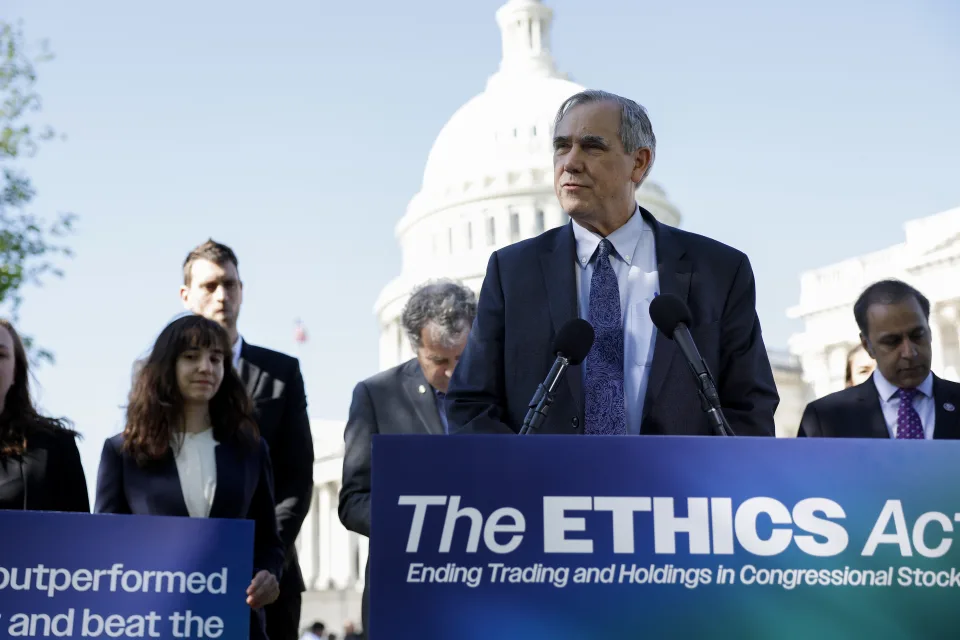
The best stock pickers in Congress have a lot in common this year. They made bets on technology stocks that churned higher amid an artificial intelligence frenzy.
They also happened to largely belong to one particular party: the Democrats.
Two exchange-traded funds that track the portfolios of US political leaders found that left-leaning lawmakers outperformed both the stock market and their GOP colleagues during a four-month period beginning in February, when the funds first launched.
Democrats have earned returns of 5.4% over just four months, higher than the 3.2% performance of the S&P 500. GOP portfolios are down over 2%.
The two ETFs – named NANC and KRUZ – allow anyone with a brokerage account to invest in what Democrat and Republican lawmakers (as well as their families) are holding at any given moment. They were created by Subversive Capital portfolio manager Christian Cooper and market research group Unusual Whales to draw attention to the issue of lawmaker stock trading.
The divergence in the portfolios has a lot to do with what Democrats like to own: technology.
Their top 5 holdings as of Friday are Microsoft (MSFT), Amazon (AMZN), Alphabet (GOOG), Apple (AAPL), and chipmaker Nvidia (NVDA). Nvidia has provided more fuel to a tech rally fueled by AI when it posted a better-than-expected quarter and blockbuster guidance in May.
The top GOP holdings look very different. They included Accenture (ACN), Energy Transfer LP (ET), Shell (SHEL), Philip Morris (PM), and Elevance Health (ELV).
Cooper is quick to note that had these ETFs existed last year – when the energy sector jumped nearly 60% – Republicans would have surely beat their colleagues on the other side of the aisle. But energy stocks have lost their luster this year, and that’s hurting Republican portfolios.
“It’s really a tale of two countries,” he said in an interview this week. Democratic portfolios, he notes, tend to be overwhelmingly focused on “things that are future focused” and that worldview is winning out at the moment.
All told, lawmakers as a whole beat the S&P 500 both in 2021 and in 2022, according to reports from Unusual Whales. Investors who took a bipartisan approach and invested equally in both funds this year might be wishing they just stuck with the S&P 500.
‘They’re generally trading less’
The returns this year are calculated from public disclosure filings required by law.
Some of these public disclosures have generated calls for Congress to ban any type of trading by members amid concerns they could leverage their privileged access to information.
That happened again this year after revelations that a few lawmakers from both parties sold banking stocks during the financial turmoil in March.
Another prominent incident happened in 2020 when then-Sens. Kelly Loeffler (R-GA) and Sen. Richard Burr (R-NC) sold an array of stocks after a private briefing on COVID-19 but before the larger public was fully aware of the coming pandemic.
Cooper says the returns in both portfolios are less a result of any day trading by lawmakers, who appear less likely to trade as scrutiny of their activity grows. “There are pockets of activities that I see,” he says but “they’re generally trading less.”
“Does oversight change behaviors?” he asks, answering “for now it appears that it has.”
But a significant contingent of lawmakers are still pushing to get the number of lawmaker trades to zero. There are at least five bills that have been introduced this Congress that would levy a ban on lawmaker trading.
One approach in the Senate comes from bipartisan lawmakers including Sens. Elizabeth Warren (D-MA) and Josh Hawley (R-MO). Another bipartisan effort in the House is up to 60 co-sponsors.
The various efforts aim to update the current rules, which have been in place since they were signed into law by then-President Obama in 2012. That legislation clarified that insider trading laws applied to lawmakers and also instituted a requirement that lawmakers disclose their trades within 45 days.
Those trade disclosures – along with annual financial reports – are what has allowed the NANC and KRUZ ETFs to exist by allowing a near-real time look at lawmakers portfolios.
For his part, Cooper expects the ETFs not to go anywhere anytime soon, pegging the chances that Congress polices itself with a ban at “near zero.”
He hopes instead for greater restrictions, such as a shorter reporting window and bigger fines for lawmakers who break the rules.
But even on that front he isn’t optimistic. “We almost defaulted on the debt, we can’t pass cannabis legalization, we can’t get basic things done,” he said this week of what he’s expecting to actually happen on Capitol Hill.























